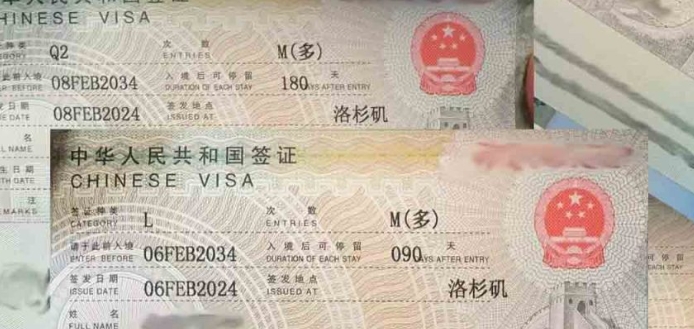- Basic concepts
A visa is a permit issued by a country’s government-authorized agency in accordance with the laws and regulations of the country to foreigners who apply to enter, exit or transit the country.
According to international law and international practice, any sovereign country has the right to decide independently whether to allow foreigners to enter or exit its country (border), issue visas, refuse visas, or revoke already issued visas in accordance with its own laws.
In accordance with laws and relevant regulations, the Chinese visa authorities decide the type, number, validity and period of stay of visas to be issued, and have the right to refuse the visa application of the person concerned or revoke the visa that has been issued.
- Visa Types
Chinese visas are divided into diplomatic visas, courtesy visas, official visas and ordinary visas. Among them, ordinary visas are divided into the following categories:
| Visa type | Applicant scope |
| C | International train crew members, international aircraft crew members who perform crew, aviation, and shipping tasks, crew members of international sailing ships and their accompanying family members, and car drivers engaged in international road transportation |
| D | Persons entering for permanent residence |
| F | Persons entering the country for exchanges, visits, inspections and other activities |
| G | Persons transiting through China |
| J1 | Foreign correspondents resident in China (residing for more than 180 days) in Chinese news organizations |
| J2 | Foreign journalists entering the country for short-term reporting (staying no more than 180 days) |
| L | Inbound tourists |
| M | Persons entering the country for commercial and trade activities |
| Q1 | Family members of Chinese citizens who apply for residence in China for family reunification (spouse, parents, children, children’s spouses, brothers and sisters, grandparents, grandchildren, and spouse’s parents) and foreigners with permanent residence status in China The person’s family members (spouse, parents, children, children’s spouses, brothers and sisters, grandparents, grandparents, grandchildren, and spouse’s parents), as well as those who apply for entry and residence due to foster care and other reasons |
| Q2 | Relatives of Chinese citizens living in China and relatives of foreigners with permanent residence status in China who enter for short-term visits (not exceeding 180 days) |
| R | Foreign high-level talents needed by the country and urgently needed specialized talents |
| S1 | Spouses, parents, children under 18 years old, parents of spouses of foreigners who enter China for long-term visits (more than 180 days) for work, study, etc., as well as persons who need to stay in China for other personal matters |
| S2 | Family members (spouse, parents, children, children’s spouses, brothers and sisters, grandparents, grandparents, grandchildren, grandchildren) of foreigners who are staying in China for work, study, etc. for short-term visits (not exceeding 180 days) (Female and spouse’s parents) and those who need to stay in China for other personal matters |
| X1 | Persons studying in China for a long period of time (more than 180 days) |
| X2 | Persons studying in China for a short period of time (not exceeding 180 days) |
| Z | People working in China |
- Hong Kong and Macao visa
(1) Hong Kong SAR visa
- The Hong Kong SAR grants visa-free treatment to people from some countries and regions (please click for details http://www.immd.gov.hk/sc/services/hk-visas/visit-transit/visit-visa-entry-permit. html#part2).
- Foreigners who do not enjoy visa-free treatment must apply for a visa to Hong Kong.
(2) Macao SAR visa
- The Macao SAR grants visa-free treatment to people from some countries and regions (please click for details https://www.gov.mo/zh-hans/services/ps-1474/ps-1474b/#6).
- Except for a few people from specific countries, foreigners who do not enjoy visa-free treatment can, in principle, apply for a visa on arrival at the Macao port.
Foreigners who apply to travel to mainland China, Hong Kong SAR, and Macau SAR at the same time must apply for mainland visa and visa for Hong Kong and Macau respectively.
- Validity period
The entry validity period of a visa (“enter before”) refers to the validity time range of the visa held by the holder to enter the country. Unless otherwise specified by the issuing authority, the visa will be effective from the date of issuance and will expire at 24:00 Beijing time on the day of expiration. If there are still unused entries, the holder can enter the country before the expiration date (including the day).
- Number of entries
The number of entries for a visa (“entries”) refers to the number of times the holder can enter the country within the validity period of the visa. A visa that has exhausted the number of entries or has not yet used up the number of entries but has expired is an invalid visa. If you need to travel to China, you must reapply for a visa. If the holder comes to China with an invalid visa, he will be refused entry.
- Period of stay
The duration of each stay of a visa (“duration of each stay”) refers to the time limit that the holder is allowed to stay each time he or she enters the country, and is calculated from the next day of entry.



